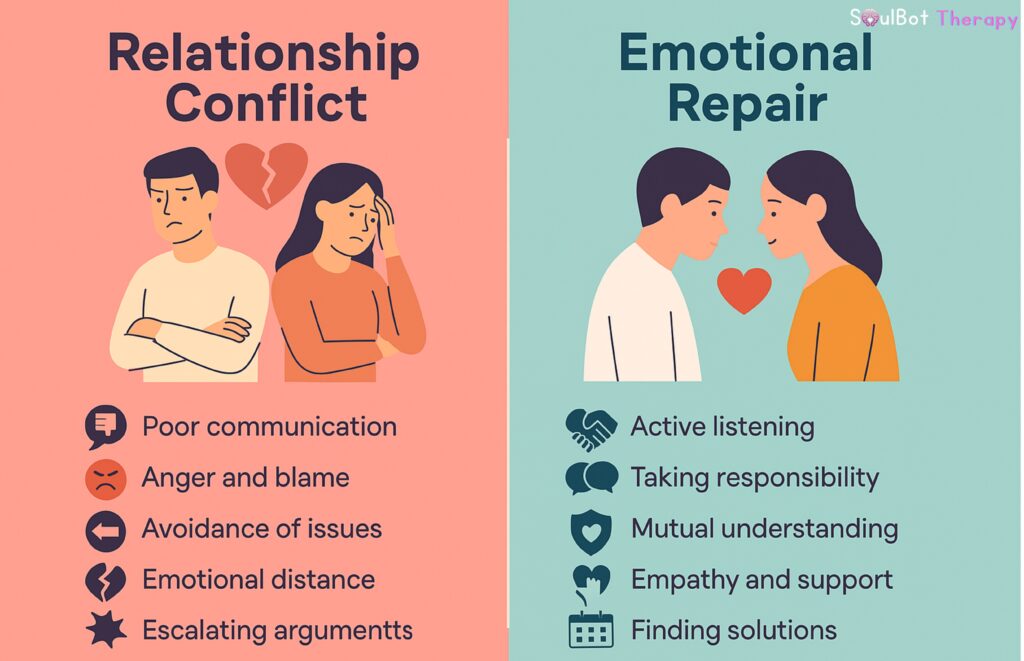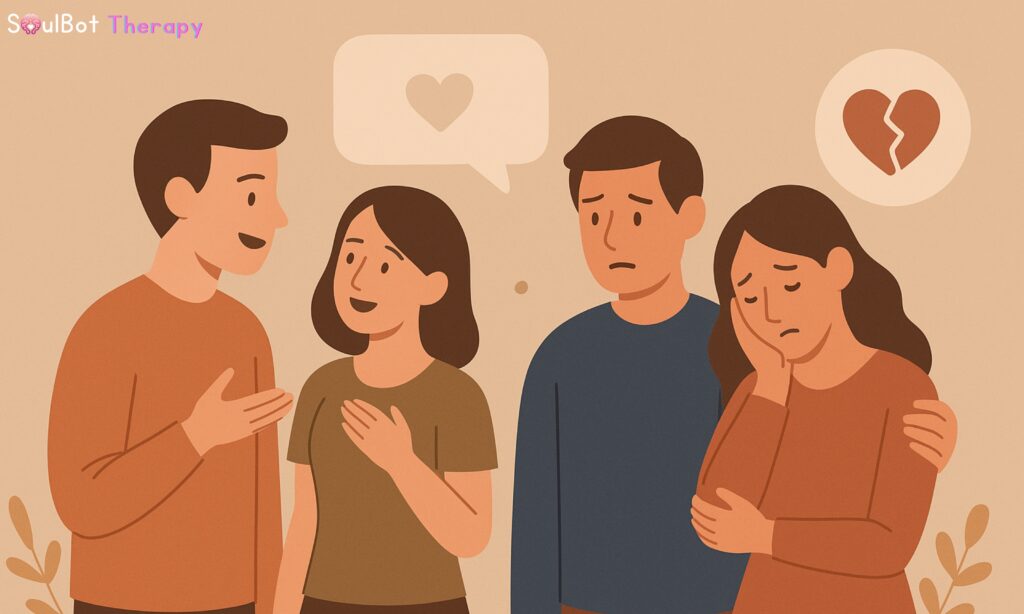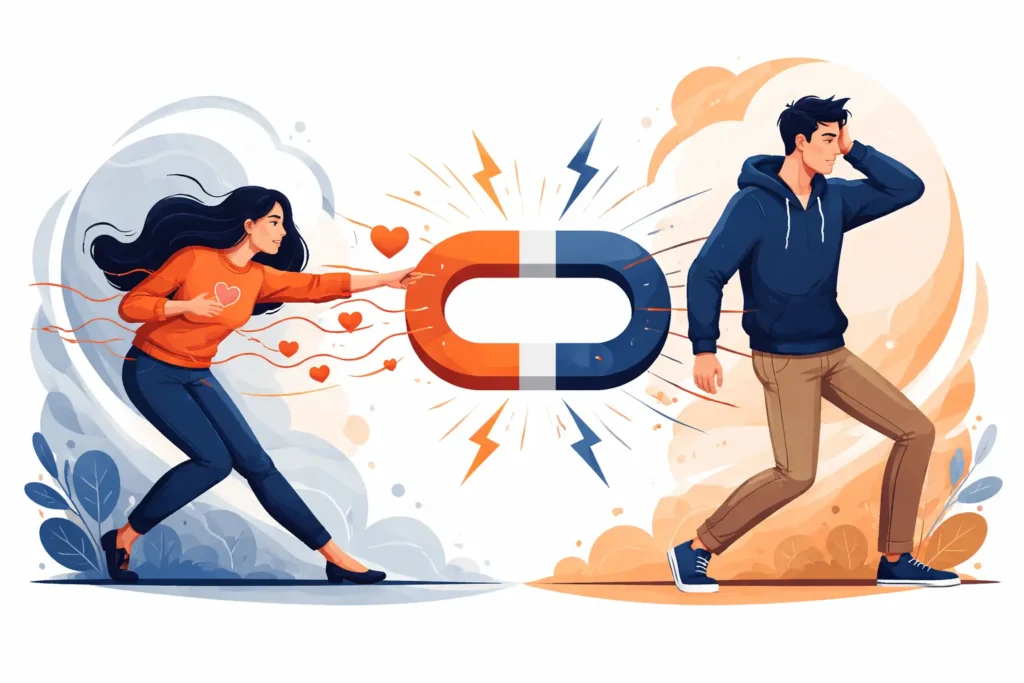Emotional intelligence in relationships is the secret skill no one teaches but everyone craves.
It’s why some people feel like an emotional home…While others make you feel drained, unseen, or confused.
EQ, your ability to understand, express, and regulate emotions, doesn’t just affect your self-growth. It profoundly shapes how you connect, love, argue, and repair with others.
In this blog, we’ll break down:
- What emotional intelligence looks like in relationships
- How low EQ shows up in love
- How to build emotional safety and deepen the connection
- And when to seek support if the patterns run deep
What Is Emotional Intelligence in Relationships?
It’s the ability to show up with empathy, clarity, and emotional safety even when things are tense.
High EQ in relationships means you can:
- Express your emotions without blaming
- Hear your partner’s pain without shutting down
- Pause when triggered
- Repair instead of avoiding
- Set boundaries with kindness
It’s not about never fighting. It’s about fighting fair, listening deeply, and staying connected even in conflict.
Why EQ Is the #1 Relationship Skill (More Than Love Languages or Communication Styles)
Anyone can memorise “I statements” or gift their partner’s love language. But without emotional intelligence, these tools fall flat. Because emotional intelligence in relationships is about:
- How safe does your nervous system feel around someone
- How quickly conflict escalates or de-escalates
- Whether trust is restored after the rupture
“You can’t connect deeply if you don’t understand your emotions or theirs.”
Signs You (or Your Partner) Have High Emotional Intelligence in Relationships
Here’s what it looks like in action:
| High EQ Trait | What It Looks Like in Love |
| Emotional awareness | “I feel hurt — not angry. I just need time to process.” |
| Empathy | “I can see how that landed wrong. That wasn’t my intent, but I get it.” |
| Regulation under stress | Pausing before replying. Asking for space without ghosting. |
| Ownership | “I was defensive. I wasn’t really hearing you, I’m sorry.” |
| Healthy boundaries | Saying no without guilt. Respecting the other person’s no without drama. |
| Repair after rupture | “I don’t want this to stay messy. Let’s talk when we’re both calm.” |
What Happens When Emotional Intelligence Is Low?
Low EQ doesn’t mean someone is toxic or evil. But it often creates emotional instability, even with love present. Here’s how low EQ in relationships might show up:
- Reactivity instead of reflection
- Frequent misunderstandings
- Gaslighting or invalidation of feelings
- Avoidance after conflict
- Silent treatments
- Shutting down instead of opening up
- Blaming instead of repairing
These behaviours lead to a lack of emotional safety, which is the foundation of any healthy connection.
📚 External Source: How Emotional Safety Drives Healthy Connection

How Emotional Intelligence Help in Romantic & Platonic Relationships?
Whether you’re talking to a partner, friend, parent, or coworker, EQ plays a massive role.
| Relationship Area | Low EQ Outcome | High EQ Outcome |
| Conflict Resolution | Escalates quickly, ends in shutdown | Gets named, explored, and resolved |
| Communication | Misinterpreted tone or silence | Clarifying questions, emotional honesty |
| Trust Building | Frequent doubt, fear of judgment | Openness, validation, non-reactivity |
| Emotional Intimacy | Avoidance, defensiveness | Vulnerability, presence, safety |
How to Build Emotional Intelligence in Relationships (Step by Step)?
🧭 Step 1: Name Your Feelings Before Speaking
EQ starts internally.
Ask: “Am I mad or scared, ashamed, or lonely?”
Naming the real emotion softens your response.
✋ Step 2: Use Boundaries, Not Walls
Say:
- “I need 20 mins to calm down before we talk.”
- “I want to hear you, but right now, I’m overwhelmed.”
Boundaries protect the connection. They don’t destroy it.
👂 Step 3: Practice Emotional Validation
Instead of fixing or arguing:
- “That makes sense.”
- “I didn’t know you felt that way. Thanks for telling me.”
Validation ≠ agreement. It just means, “I get it.”
🛠 Step 4: Repair (Even When You Didn’t Mean To Hurt Them)
Intent ≠ impact. EQ means: “I didn’t mean to, but I did. I care, and I want to make it right.”
Repair builds trust.
🧪 Want to Check Your Relationship EQ?
We’re building a free Emotional Intelligence Test that will help you reflect on:
- How do you handle emotional triggers
- How you respond to others’ needs
- Your communication + conflict styles
- Whether your connection feels safe or reactive
Final Thought: EQ Is the Language of Love And Repair
We don’t need perfection in love. We need reflection. Regulation. Real apologies. Safer spaces. That’s what emotional intelligence in relationships makes possible.
If this blog made you reflect, that’s not a weakness. That’s growth. Need help navigating emotional patterns, attachment, or communication issues?
👉 Book a Free Consultation with SoulBot → Try here
A trained psychologist can assist you in exploring your relationship dynamics without judgment.








